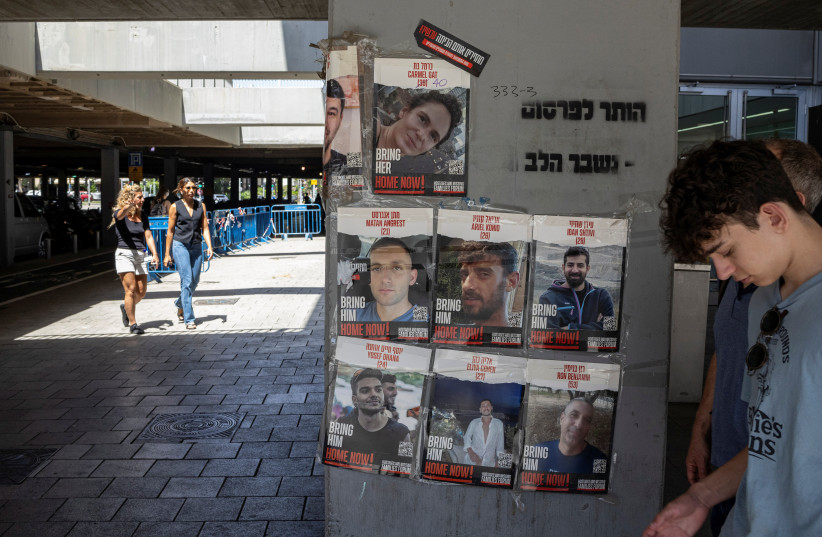While the Israelis were building a magnificent country, we were also missing the reality of the larger neighborhood we were thriving in.
It has become something of a cottage industry here since October 7 to identify important aspects of our society that were profoundly misdirected, misconceived, or just plain oblivious to what Hamas and Hezbollah really wanted and were truly about.
The primary targets of such inquiry and investigation have been our political, military, and intelligence leadership. With the benefit of 20/20 hindsight – thrust upon us by Hamas’s subhuman attacks and the revelation of the evil genius that is their subterranean world of tunnels – we have examined the assumptions and guiding principles of our various leaders and have found them wanting.
Not just wanting; rooted in a belief system that we now realize was completely unrealistic – and ultimately reflected a world we wanted to assume existed, rather than one that we could astutely ascertain did in fact exist.
Even if we knew that our enemies were not just like us, we nevertheless attributed to them priorities and values with a strong relationship to those that drive and inform us. Our leaders made a variation of the same disastrous mistake that Western leaders have been making since the end of the Cold War: believing that they want what we want and can be motivated to act civilly based on appealing to those shared desires.

In short, they could be bought off or deterred with hi-tech gizmos.
During those same years when our leaders were so delusional, what were we doing on the home front? Were we sounding the alarm, calling attention to what has turned out to be the true motivating force of our enemies? Some of us were; but as a society, we were focused on creating a society enthralled with the power and potential of technology, addicted to innovation, and fully intent on creating a blooming flower in the desert of our ancestral homeland.
The Jewish state's rise to success
In short, we pursued the good life. We founded industries and companies, we fell in love with real estate, good food, and other attributes we had previously encountered only in our travels, but not at home.
And we succeeded! We became the Start-Up Nation, one of the happiest nations on Earth, the place that defied the Western norm of decline into existential despair.
New immigrants no longer had to sacrifice “the good life” in order to attain meaningful lives. We had become the beacon for the Jewish people worldwide, and a source of great pride and fulfillment for Christian Zionists and others who saw prophetic realization in our return and our success.
But honestly, weren’t we also guilty of not seeing the picture for what it is, of not wanting to look too hard at the situation?
We noticed that young Jews were no longer interested in agriculture or trades. Rather than admit that we needed to strive to be more self-sufficient, we figured, well why not make more money and hire Palestinians, Thais, Filipinos, whomever, to do the grubbier stuff?
We became a wealthier but less cohesive nation. There were the great winners – equity holders in companies that were bought out – and those who created, innovated, and invented.
Our GDP became, per capita, one of the highest in the world, though of course there were growing and glaring differences between those at the top and everyone else. Those who lived close to our borders, who might have been more sensitive to and suspicious of the motives and desires of our Gazan or Lebanese neighbors, did not sound alarm bells. Quite the opposite; we sought to be good neighbors, caring and desiring to co-exist and to show by our example that friendship and amity could prevail.
All of these rose-colored constructs have been stripped from before our eyes and we now find ourselves in an increasingly implacable, irredeemably hostile world, where our kindness was misplaced, and our priorities have left us bereft.
Where does this leave us? There is a broad consensus for the need to look critically at the ideas and the people who have been steering our ship, and to hold them accountable for their misunderstandings and errors.
We also need to look at ourselves and ask what we must now do in order to rectify that great misconception. One of the silver linings in the current situation has been the appreciation for the spirit, strength, and determination of our youth. Our soldiers are showing us the way with their resolve. We need to mirror that resolve. We need to demand of our leaders the same kind of determination that our young people, our future leaders, are showing.
We must send more of our people into the fields to do agricultural work. Not everyone is hi-tech material, and there should be a national push for training Jewish plumbers, electricians, construction engineers, and workers.
We must demand greater self-sufficiency from our leadership. We need to be manufacturing much more of our weapons in Israel. This will require factories and these will require trained workers. Every sector of society, the ultra-Orthodox included, should be available to help fulfill this strategic need.
Jews are not Spartans. We love life and we love living. I am neither advocating the dissolution of our society nor the suppression of our desire to live full and enjoyable lives.
However, we need to see ourselves as active agents in the great re-awakening that we refer to as “the day after.” Our involvement in this important effort will only enhance our sense of the great meaningfulness that living in this extraordinary place has provided for so many of us.
The “day after” beckons. Let’s seize the day.
The writer is the chairman of the board of Im Tirtzu and a director of the Israel Independence Fund.
